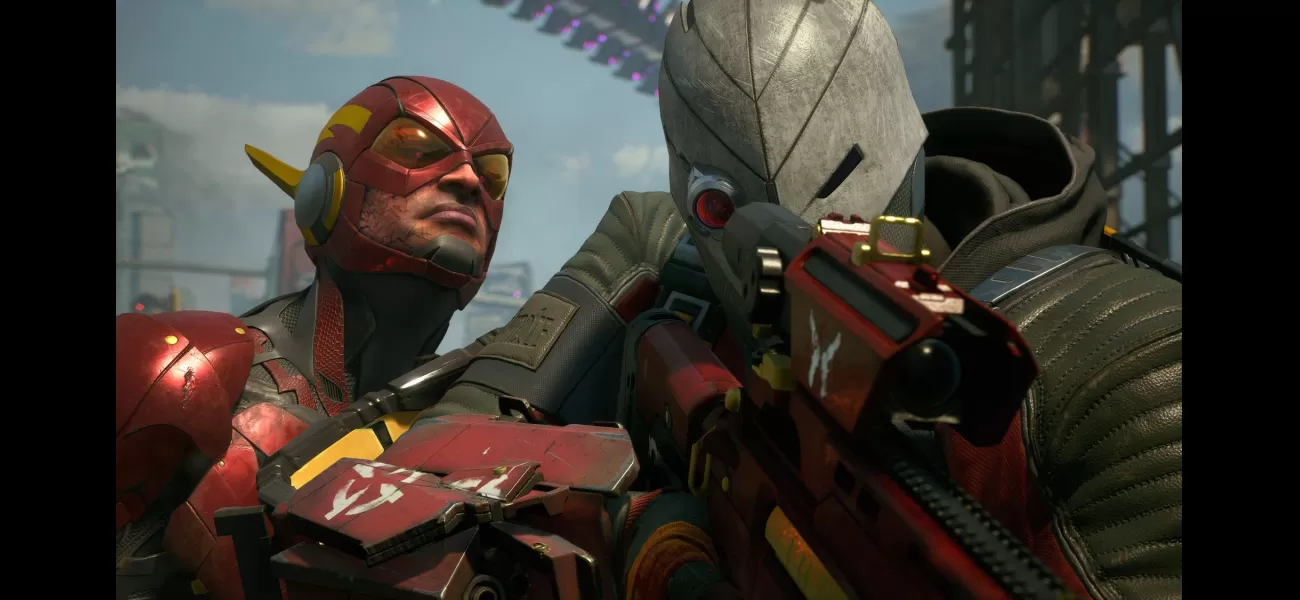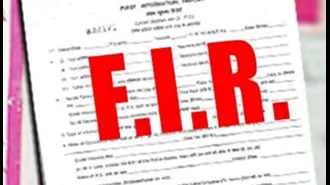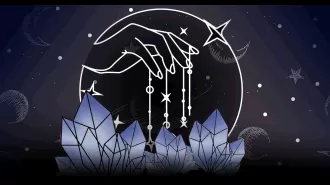DC’s answer to the Avengers is off to a promising start, with Suicide Squad's mission to take down the Justice League showing potential.
GameCentral's initial experience with the highly anticipated sequel to Batman: Arkham Knight, which replaces heroes with villains.
January 31st 2024.

The much-anticipated game Suicide Squad: Kill The Justice League has finally arrived, but is it living up to the hype? As a follow-up to the popular Batman: Arkham Knight, this game takes a different approach by focusing on supervillains rather than superheroes. After playing for around seven hours, we can confidently say that we don't hate it, although there are some issues that may become problematic in the long run.
First and foremost, it's clear that this game was not worth the eight-year wait since its predecessor. The graphics and gameplay mechanics seem to belong to a previous generation, and there are rumors that it was originally intended to be a microtransaction-filled game before changing direction multiple times. The result is a confusing mishmash of ideas that don't quite come together cohesively.
Despite playing for several hours, the plot of the game remains unclear. The main villain, Brainiac, is nowhere to be seen and the city is overrun with biomechanical monsters and brainwashed superheroes. It's a chaotic and disorienting environment, and even as seasoned gamers, we found it difficult to keep up with what was happening. The role of the titular Suicide Squad is also unclear, as they are tasked with taking on an army of alien invaders with no explanation of how they are supposed to do it.
The game starts off with a series of tutorial levels that feel rushed and poorly put together. It's almost as if the developers realized at the last minute that they hadn't explained the controls and threw these levels in as an afterthought. While each character has their own unique abilities, the gameplay itself is quite repetitive and lacks the depth and complexity of other similar games.
Speaking of characters, the Suicide Squad consists of Harley Quinn, Deadshot, Captain Boomerang, and King Shark. While they may not have superpowers, they each have their own gadgets and weapons, and their interactions are the highlight of the game. However, there is a lack of variety in the enemies they face, and the missions quickly become formulaic and uninteresting.
One of the game's biggest downfalls is its lack of a living, breathing city. Unlike other open-world games, there are no civilians to be found, which makes the city feel artificial and lifeless. The missions themselves also lack variety, with a few different types that quickly become overused. Overall, it's a disappointment compared to the rich and dynamic world of Batman: Arkham Knight.
Despite all the flaws, the game does have its enjoyable moments. The gunplay is solid and satisfying, and the abilities of each character add some variety to the gameplay. However, it's not enough to make up for the numerous shortcomings, and it's hard not to compare it to other similar games like Marvel's Avengers and Crackdown.
In conclusion, Suicide Squad: Kill The Justice League is not a terrible game, but it's also not a great one. It lacks the polish and depth of its predecessor and falls short in terms of gameplay and story. It may appeal to die-hard fans of the Suicide Squad or those looking for a mindless action game, but for most players, it will likely be a forgettable experience.
After eight long years since the release of Batman: Arkham Knight, fans have eagerly awaited the arrival of Suicide Squad: Kill The Justice League. This highly anticipated sequel trades in the caped crusader for a team of supervillains, promising a unique gaming experience. And after spending the first half-day immersed in the game, GameCentral is ready to share their initial thoughts.
After seven hours of gameplay, it's safe to say that Suicide Squad is not a game to hate. While there are already signs of repetition, it's not on the same level as Lord Of The Rings: Gollum, which is notorious for its clunky gameplay. From what we've seen so far, Suicide Squad is not a bad game, but it's not a great one either.
One thing that is clear is that the long wait for this game was not worth it. With eight years since the release of Batman: Arkham Knight, it's surprising that Suicide Squad feels like it was designed for the previous generation of consoles. There's even speculation that the game was initially intended to be filled with microtransactions and lootboxes, but those plans were scrapped after the backlash against Star Wars: Battlefront 2. This could explain the game's direction towards a live service model, similar to Marvel's Avengers, before ultimately settling on a Destiny 2-style experience with superheroes.
Despite playing for several hours, the plot has yet to pick up, with no appearance from the main villain, Brainiac. The game's setting of a Metropolis overrun by biomechanical monsters and brainwashed superheroes is intriguing, but the lack of explanation can leave players feeling confused. Even the role of the titular Suicide Squad is unclear, consisting of supervillains with no superpowers, controlled by a shadowy government agency. It's questionable how characters like Harley Quinn and Captain Boomerang can stand a chance against an alien army of 8 million.
The game's tutorial levels are also a letdown, feeling hastily put together with little explanation of the controls. While each character has their own unique abilities, the gameplay is essentially the same for all of them. Suicide Squad is a third-person shooter, similar to Crackdown, with solid gunplay and satisfying headshots. However, the lack of more diverse weapons, like ray guns or shrink rays, is a missed opportunity.
The game's movement system allows for parkour-style traversal, but it's not as enjoyable as Spider-Man 2's web-swinging and gliding. Even Harley Quinn's use of Batman's equipment feels lackluster. The combat is also underwhelming, with a single melee button and no real depth. The only real puzzles so far have been collecting trophies and checkpoint races. And while the lack of regular civilians may make sense for a game about supervillains, it takes away from the immersion of the city.
As the missions continue, it's becoming apparent that they lack variety, with the same types of objectives being repeated. Defending locations, catching civilians, and destroying crystals are just some of the tasks players will encounter. It's also disappointing that the enemies are faceless and robotic, with limited personalities and generic designs. This is a similar mistake made by Square Enix's Avengers game, which also failed to utilize its source material effectively.
But all is not lost for Suicide Squad. The game does feature four-player co-op, although most of our playthrough was spent solo with AI-controlled squadmates. The ability to switch between characters at any time adds some variety to the gameplay. And while Captain Boomerang's abilities and character stood out, the lack of memorable and charismatic opponents is a missed opportunity.
In the end, Suicide Squad: Kill The Justice League may not live up to the hype, but it's not a complete failure either. With solid gunplay and traversal, it has its moments, but it lacks the depth and uniqueness expected from a game about supervillains. And with similarities to Square Enix's Avengers, it's hard not to draw comparisons. But with the potential for updates and improvements, Suicide Squad may still have a chance to redeem itself.
First and foremost, it's clear that this game was not worth the eight-year wait since its predecessor. The graphics and gameplay mechanics seem to belong to a previous generation, and there are rumors that it was originally intended to be a microtransaction-filled game before changing direction multiple times. The result is a confusing mishmash of ideas that don't quite come together cohesively.
Despite playing for several hours, the plot of the game remains unclear. The main villain, Brainiac, is nowhere to be seen and the city is overrun with biomechanical monsters and brainwashed superheroes. It's a chaotic and disorienting environment, and even as seasoned gamers, we found it difficult to keep up with what was happening. The role of the titular Suicide Squad is also unclear, as they are tasked with taking on an army of alien invaders with no explanation of how they are supposed to do it.
The game starts off with a series of tutorial levels that feel rushed and poorly put together. It's almost as if the developers realized at the last minute that they hadn't explained the controls and threw these levels in as an afterthought. While each character has their own unique abilities, the gameplay itself is quite repetitive and lacks the depth and complexity of other similar games.
Speaking of characters, the Suicide Squad consists of Harley Quinn, Deadshot, Captain Boomerang, and King Shark. While they may not have superpowers, they each have their own gadgets and weapons, and their interactions are the highlight of the game. However, there is a lack of variety in the enemies they face, and the missions quickly become formulaic and uninteresting.
One of the game's biggest downfalls is its lack of a living, breathing city. Unlike other open-world games, there are no civilians to be found, which makes the city feel artificial and lifeless. The missions themselves also lack variety, with a few different types that quickly become overused. Overall, it's a disappointment compared to the rich and dynamic world of Batman: Arkham Knight.
Despite all the flaws, the game does have its enjoyable moments. The gunplay is solid and satisfying, and the abilities of each character add some variety to the gameplay. However, it's not enough to make up for the numerous shortcomings, and it's hard not to compare it to other similar games like Marvel's Avengers and Crackdown.
In conclusion, Suicide Squad: Kill The Justice League is not a terrible game, but it's also not a great one. It lacks the polish and depth of its predecessor and falls short in terms of gameplay and story. It may appeal to die-hard fans of the Suicide Squad or those looking for a mindless action game, but for most players, it will likely be a forgettable experience.
After eight long years since the release of Batman: Arkham Knight, fans have eagerly awaited the arrival of Suicide Squad: Kill The Justice League. This highly anticipated sequel trades in the caped crusader for a team of supervillains, promising a unique gaming experience. And after spending the first half-day immersed in the game, GameCentral is ready to share their initial thoughts.
After seven hours of gameplay, it's safe to say that Suicide Squad is not a game to hate. While there are already signs of repetition, it's not on the same level as Lord Of The Rings: Gollum, which is notorious for its clunky gameplay. From what we've seen so far, Suicide Squad is not a bad game, but it's not a great one either.
One thing that is clear is that the long wait for this game was not worth it. With eight years since the release of Batman: Arkham Knight, it's surprising that Suicide Squad feels like it was designed for the previous generation of consoles. There's even speculation that the game was initially intended to be filled with microtransactions and lootboxes, but those plans were scrapped after the backlash against Star Wars: Battlefront 2. This could explain the game's direction towards a live service model, similar to Marvel's Avengers, before ultimately settling on a Destiny 2-style experience with superheroes.
Despite playing for several hours, the plot has yet to pick up, with no appearance from the main villain, Brainiac. The game's setting of a Metropolis overrun by biomechanical monsters and brainwashed superheroes is intriguing, but the lack of explanation can leave players feeling confused. Even the role of the titular Suicide Squad is unclear, consisting of supervillains with no superpowers, controlled by a shadowy government agency. It's questionable how characters like Harley Quinn and Captain Boomerang can stand a chance against an alien army of 8 million.
The game's tutorial levels are also a letdown, feeling hastily put together with little explanation of the controls. While each character has their own unique abilities, the gameplay is essentially the same for all of them. Suicide Squad is a third-person shooter, similar to Crackdown, with solid gunplay and satisfying headshots. However, the lack of more diverse weapons, like ray guns or shrink rays, is a missed opportunity.
The game's movement system allows for parkour-style traversal, but it's not as enjoyable as Spider-Man 2's web-swinging and gliding. Even Harley Quinn's use of Batman's equipment feels lackluster. The combat is also underwhelming, with a single melee button and no real depth. The only real puzzles so far have been collecting trophies and checkpoint races. And while the lack of regular civilians may make sense for a game about supervillains, it takes away from the immersion of the city.
As the missions continue, it's becoming apparent that they lack variety, with the same types of objectives being repeated. Defending locations, catching civilians, and destroying crystals are just some of the tasks players will encounter. It's also disappointing that the enemies are faceless and robotic, with limited personalities and generic designs. This is a similar mistake made by Square Enix's Avengers game, which also failed to utilize its source material effectively.
But all is not lost for Suicide Squad. The game does feature four-player co-op, although most of our playthrough was spent solo with AI-controlled squadmates. The ability to switch between characters at any time adds some variety to the gameplay. And while Captain Boomerang's abilities and character stood out, the lack of memorable and charismatic opponents is a missed opportunity.
In the end, Suicide Squad: Kill The Justice League may not live up to the hype, but it's not a complete failure either. With solid gunplay and traversal, it has its moments, but it lacks the depth and uniqueness expected from a game about supervillains. And with similarities to Square Enix's Avengers, it's hard not to draw comparisons. But with the potential for updates and improvements, Suicide Squad may still have a chance to redeem itself.
[This article has been trending online recently and has been generated with AI. Your feed is customized.]
[Generative AI is experimental.]
0
0
Submit Comment





